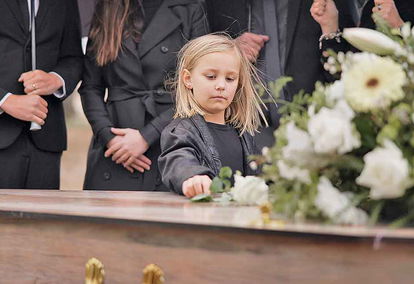
Death is never an easy subject to broach, even with adults, let alone preschoolers. Grief and loss are multifaceted processes that each person approaches differently. There are several key things to remember when discussing these topics with preschoolers.
Preschoolers are inexperienced in the area of death. Most have not lived long enough to have any prior experiences to draw upon. Thus, you are helping them lay the foundation blocks for how they will deal with death going forward.
It is crucial that you are honest with preschoolers and answer their questions. This not only builds a trusting relationship with you for future guidance, but it is the basis of the coping skills preschoolers will develop over time.
Preschoolers are concrete thinkers. They need simple and direct language to understand what is going on around them.
- Avoid metaphoric language like “she went to sleep” or “he passed away” because it can lead to misunderstanding and fear. A child may begin to fear going to sleep or other family members going to sleep because they think they may be dying too.
- Instead, use concrete language like “dead” or “died,” or explanative language like “his body stopped working.”
- Give clear, age-appropriate facts that distinguish death. Explain that death is an end to life on earth. This helps the preschooler to define death as something different than “going away for a time” and helps avoid other associations like “moved away” or other temporary situations.
Be clear in your faith explanations.
Faith should be the source of our management of life. Beginning as early as preschool, it is vital that we teach preschoolers how our faith guides, sustains, explains, and shapes our navigation through all that life brings.
- Use concrete language when talking about faith. Avoid statements like “God took her to be with Him” or “He is in a better place.” Phrases like these lend a child’s mind to fear or hold anger toward God. They may question, “Is God going to take me too?” or “Why isn’t being with me good enough? Am I so bad?”
- Talk with the preschooler about how God intentionally formed humankind and established a cycle to life. Introduce the idea that God’s ways are not our ways because He knows so much more than we do (Isa. 55:8). With that knowledge, He has created a plan specific to each one of us that is “to prosper you and not to harm you, plans to give you hope and a future” (Jer. 29:11).
- Answer their questions. Be very intentional with your word choice. Preschoolers learn by asking questions. Take the time to answer whatever they ask. Remember they are processing events in very concrete terms with limited life experience. They may have seen or heard something that has them confused or perplexed. Your word choice is significant, so take the time to carefully select your words as you answer.
As always, an awareness of what a child is dealing with, being available for that child, and using a prayer-guided approach will help you circumnavigate pitfalls and steer to solid foundational ground as you help preschoolers dealing with stressful situations.
Gina Smith has been crazy about missions ever since she was a Sunbeam. One of her greatest joys in life is teaching people about Jesus and doing hands-on missions. She has been a missions educator since her early teens and has written for WMU for 18 years.
Disclaimer: The information shared on this page is not meant to diagnose or treat a mental health condition. We encourage you to follow up with your health-care provider and seek a mental health professional for individual consultation and care.